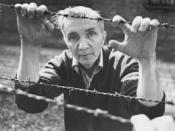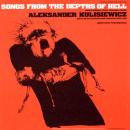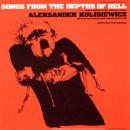Słyszcie nasz chorał z piekła dna!
Niech naszym katom w uszach gra
Chorał! Chorał z piekła dna!
Niech naszym katom,
Niech naszym katom gra!
Słyszcie nasz chorał,
Słyszcie nasz chorał z piekła dna!
Attention! Attention!
Tu ludzie giną, tu ludzie są!
Tu ludzie są!
Niech naszym katom w uszach gra
Chorał! Chorał z piekła dna!
Niech naszym katom,
Niech naszym katom gra!
Słyszcie nasz chorał,
Słyszcie nasz chorał z piekła dna!
Attention! Attention!
Tu ludzie giną, tu ludzie są!
Tu ludzie są!
Contributed by Riccardo Venturi - 2009/1/7 - 01:31
Language: English
English version from the album booklet:
CHORAL FROM THE DEPTHS OF HELL
Hear our choral from the depths of hell!
May it keep our killers from sleeping well
Choral! Choral song from hell
Keep our killer
from ever sleeping well.
Hear our choral!
Hear our choral from the depths of hell!
Attention! Attention!
We're people dying, yes, people here,
We're people here!
Hear our choral from the depths of hell!
May it keep our killers from sleeping well
Choral! Choral song from hell
Keep our killer
from ever sleeping well.
Hear our choral!
Hear our choral from the depths of hell!
Attention! Attention!
We're people dying, yes, people here,
We're people here!
Contributed by Riccardo Venturi - 2009/1/7 - 01:39
Language: Italian
Versione italiana di Riccardo Venturi
Dalla versione inglese
Dalla versione inglese
CORALE DAL PROFONDO DELL'INFERNO
Ascoltate la nostra corale dal profondo dell'inferno!
Che possa impedire ai nostri assassini di dormire bene
Corale! Corale dall'inferno,
Che impedisca ai nostri assassini
di dormire bene.
Ascoltate la nostra corale!
Ascoltate la nostra corale dal profondo dell'inferno!
Attenzione! Attenzione!
Siamo gente che muore, sì, gente qua dentro,
Siamo gente qua dentro!
Ascoltate la nostra corale dal profondo dell'inferno!
Che possa impedire ai nostri assassini di dormire bene
Corale! Corale dall'inferno,
Che impedisca ai nostri assassini
di dormire bene.
Ascoltate la nostra corale!
Ascoltate la nostra corale dal profondo dell'inferno!
Attenzione! Attenzione!
Siamo gente che muore, sì, gente qua dentro,
Siamo gente qua dentro!
Language: Italian
Versione italiana di Daniele Goldoni
Dall'album Voci dal profondo inferno
Concerto registrato il 27 gennaio 2017 presso l’Auditorium di Muggiò

Dall'album Voci dal profondo inferno
Concerto registrato il 27 gennaio 2017 presso l’Auditorium di Muggiò

Dona Dona - Canzone del ghetto di Varsavia - - Rivkele di Sabato - Il nostro Shtetl brucia - Minuti di certezza - I soldati della palude - Canto di Dachau - Corale dal profondo dell’inferno - Se il cielo fosse bianco di carta Chaim - Ninna nanna del figlio nel crematorio - Dieci fratelli - Dieci milioni - Qui in questa terra
CORALE DAL PROFONDO DELL’INFERNO
Questo è il corale
Dal profondo dell’inferno
Risuoni nelle orecchie
Degli aguzzini nostri
Corale
Corale
Dal fondo dell’inferno
Degli aguzzini nostri
Degli aguzzini nostri
Risuoni
Degli aguzzini nostri
Il nostro corale
Degli aguzzini nostri
Il nostro corale
Dal fondo dell’inferno
Attenzione
Attenzione
Attenzione
Attenzione
Qui muoiono gli uomini!
Qui muoiono gli uomini!
Qui muoiono gli uomini!
Le nostre voci
Salgono
Dal più profondo
Inferno
Per voi
Salgono
Per voi che siete
I nostri carnefici
Le nostre voci
Dal più profondo
Inferno a voi
Arrivino
In questo inferno
Persino la morte chiede pietà.
Questo è il corale
Dal profondo dell’inferno
Risuoni nelle orecchie
Degli aguzzini nostri
Corale
Corale
Dal fondo dell’inferno
Degli aguzzini nostri
Degli aguzzini nostri
Risuoni
Degli aguzzini nostri
Il nostro corale
Degli aguzzini nostri
Il nostro corale
Dal fondo dell’inferno
Attenzione
Attenzione
Attenzione
Attenzione
Qui muoiono gli uomini!
Qui muoiono gli uomini!
Qui muoiono gli uomini!
Le nostre voci
Salgono
Dal più profondo
Inferno
Per voi
Salgono
Per voi che siete
I nostri carnefici
Le nostre voci
Dal più profondo
Inferno a voi
Arrivino
In questo inferno
Persino la morte chiede pietà.
Contributed by Dq82 - 2024/8/25 - 10:48
Language: French
Version française – Chœur du fond de l'enfer – Marco Valdo M.I. – 2009
Version italienne – Corale dal profondo del inferno - Riccardo Venturi – 2009
Chanson polonaise - Chorał z piekła dna - Aleksander Kulisiewicz – Paroles : Leonard Krasnodębski – 1942
Version italienne – Corale dal profondo del inferno - Riccardo Venturi – 2009
Chanson polonaise - Chorał z piekła dna - Aleksander Kulisiewicz – Paroles : Leonard Krasnodębski – 1942
Le jeune poète et journaliste de Varsovie, Leonard Krasnodębski, écrivit le texte de ce « Chœur » en 1942 au camp de concentration de Sachsenhausen (au nord de Berlin). Il était infirmier à « l'hôpital » du camp, où il fut témoin des expérimentations bestiales menées par le Dr. Paul Schmitz, SS, qui testait les effets de gaz empoisonnés nouveaux sur les prisonniers. Krasnodębski, qui avait vu et connaissait trop la nature de ces expériences, fut forcé par les SS à se suicider en 1943. Kulisiewicz composa cette mélodie en octobre 1944 pour commémorer le compositeur juif allemand, Rosebery D'Arguto, qui mourut à Auschwitz en 1943. Alex chanta pour la première fois cette chanson pour les patients de « l'hôpital » du camp. À ce moment, il était temporairement aveugle.
Aleksander Kulisiewicz (1918-1982) était étudiant en droit dans la partie de la Pologne occupée par les Allemands quand, en octobre 1939, il fut dénoncé pour des écrits anti-fascistes, arrêté par la Gestapo et envoyé au camp de concentration de Sachsenhausen, près de Berlin. Chanteur amateur et chantauteur, Aleksander Kulisiewicz composa 54 chansons durant les près de six ans de son emprisonnement à Sachsenhausen. Après la libération, il se remémora ces chansons ainsi que celles apprises de camarades prisonniers, dictant des centaines de pages de textes à son infirmière polonaise.
La présente version est établie à partir de la version italienne de Riccardo Venturi.
Aleksander Kulisiewicz (1918-1982) était étudiant en droit dans la partie de la Pologne occupée par les Allemands quand, en octobre 1939, il fut dénoncé pour des écrits anti-fascistes, arrêté par la Gestapo et envoyé au camp de concentration de Sachsenhausen, près de Berlin. Chanteur amateur et chantauteur, Aleksander Kulisiewicz composa 54 chansons durant les près de six ans de son emprisonnement à Sachsenhausen. Après la libération, il se remémora ces chansons ainsi que celles apprises de camarades prisonniers, dictant des centaines de pages de textes à son infirmière polonaise.
La présente version est établie à partir de la version italienne de Riccardo Venturi.
CHOEUR DU FOND DE L'ENFER
Écoutez notre choeur des profondeurs de l'enfer !
Qui peut empêcher nos assassins de dormir tranquilles.
Choeur ! Choeur de l'enfer,
Qui empêche nos assassins
De dormir tranquilles.
Écoutez notre chorale des profondeurs de l'enfer !
Qui peut empêcher nos assassins de dormir tranquilles.
Nous sommes des gens qui meurent, si, des gens là-dedans,
Nous sommes des gens là-dedans !
Écoutez notre choeur des profondeurs de l'enfer !
Qui peut empêcher nos assassins de dormir tranquilles.
Choeur ! Choeur de l'enfer,
Qui empêche nos assassins
De dormir tranquilles.
Écoutez notre chorale des profondeurs de l'enfer !
Qui peut empêcher nos assassins de dormir tranquilles.
Nous sommes des gens qui meurent, si, des gens là-dedans,
Nous sommes des gens là-dedans !
Contributed by Marco Valdo M.I. - 2009/1/8 - 13:00
Language: German
Traduzione tedesca reperita su Kazett - Lyrik, una ricerca del 2001 condotta da Sophie Luise Bauer.
In tedesco nel disco di AA. VV. dedicato ad Alexander Kulisiewicz e intitolato “Lieder aus der Hölle”
In tedesco nel disco di AA. VV. dedicato ad Alexander Kulisiewicz e intitolato “Lieder aus der Hölle”
CHORAL AUS DER TIEFE DER HÖLLE
Hört unseren Choral
Aus der Tiefe der Hölle!
Er soll unseren Henkern
Auf ewig die Träume stören!
Choral, Choral!
Aus der Tiefe der Hölle,
Er soll unseren Henkern
die Träume stören...
die Träume stören,
für immer die Träume stören!
Hört unseren Choral!
Hört doch unseren Choral!
Aus der Tiefe der Hölle...
Hier krepieren Menschen,
auch hier sind MENSCHEN!!!
Hört unseren Choral
Aus der Tiefe der Hölle!
Er soll unseren Henkern
Auf ewig die Träume stören!
Choral, Choral!
Aus der Tiefe der Hölle,
Er soll unseren Henkern
die Träume stören...
die Träume stören,
für immer die Träume stören!
Hört unseren Choral!
Hört doch unseren Choral!
Aus der Tiefe der Hölle...
Hier krepieren Menschen,
auch hier sind MENSCHEN!!!
Contributed by Bernart Bartleby - 2014/2/13 - 14:36
×
![]()
Note for non-Italian users: Sorry, though the interface of this website is translated into English, most commentaries and biographies are in Italian and/or in other languages like French, German, Spanish, Russian etc.









Lyrics/Testo: Leonard Krasnodębski
Music/Musica: Aleksander Kulisiewicz
Aleksander Kulisiewicz: Songs From The Depths Of Hell
Folkways Records Album N° FSS 37700 (1979)
PDF Booklet Available
Annotated by Peter Wortsman
La copertina dell'album, ispirata a questa canzone, è di Gertrude Degenhardt, moglie di Franz-Josef Degenhardt.
The album cover, inspired by this song, is by Gertrude Degenhardt, Franz-Josef Degenhardt's wife.
Aleksander Kulisiewicz (1918-1982) was a law student in German-occupied Poland when, in October 1939, he was denounced for anti-fascist writings, arrested by the Gestapo, and sent to the Sachsenhausen concentration camp, near Berlin. An amateur singer and songwriter, Kulisiewicz composed 54 songs during nearly six years of imprisonment at Sachsenhausen. After liberation he remembered his songs, as well as those learned from fellow prisoners, dictating hundreds of pages of text to his attending nurse at a Polish infirmary.
Polish - Music: Aleksander Kulisiewicz
Words: Leonard Krasnodębski
The young poet and journalist from Warsaw, Leonard Krasnodębski, wrote the text of “Chorał” in 1942 in the concentration camp Sachsenhausen (north of Berlin). He was a male nurse in the camp “hospital”, where he witnessed the bestial experiments carried out by SS-Dr. Paul Schmitz, who tested the effects of new, quick action poisonous gases on prisoners. Krasnodębski, who had seen and knew far too much of the nature of these experiments, was forced by the SS to commit suicide in 1943. Kulisiewicz composed the melody in October 1944 to commemorate the German Jewish composer, Rosebery D'Arguto, who died in Auschwitz in 1943. Alex first performed the song for fellow patients in the camp “hospital”. At the time he was temporarily blind.